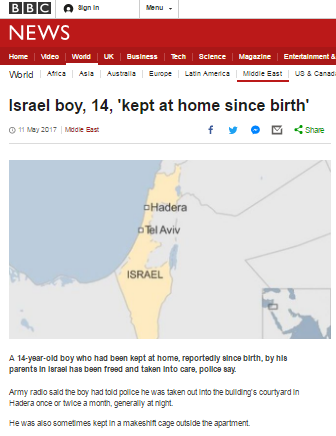On May 11th a report titled “Israel boy, 14, ‘kept at home since birth’” appeared on the BBC News website’s Middle East page where it remained in situ and unchanged for four consecutive days.
“A 14-year-old boy who had been kept at home, reportedly since birth, by his parents in Israel has been freed and taken into care, police say.
Army radio said the boy had told police he was taken out into the building’s courtyard in Hadera once or twice a month, generally at night.
He was also sometimes kept in a makeshift cage outside the apartment.
The parents, who have been arrested, say they acted out of concern for the boy’s health.”
However, less than a day after that report was published the story changed significantly. The parents were cleared of suspicion of neglect or abuse, released from custody and permitted to visit their son in hospital. The “makeshift cage” reported by the BBC turned out to be a storeroom for cans which the unemployed father collected and recycled for cash as well as a workshop where he repaired bicycles. The allegation that the boy had been “kept at home since birth” that appears in the BBC’s headline was shown to be untrue.
On May 15th (while the BBC’s report was still in place) the same Army radio station quoted in the BBC’s article reported that the boy is to return home.
Nevertheless, the BBC’s article was not amended to reflect those developments, meaning that for four consecutive days visitors to the BBC News website read an inaccurate story concerning the supposed abuse and neglect of a minor.
As regular readers are aware, the BBC News website has a curious penchant for domestic stories from Israel – particularly those of a legal/criminal genre – that are of little or no interest to foreign audiences. If the corporation is going to publish such stories, it clearly has the journalistic responsibility to ensure that they are accurate and to keep them updated as developments come to light.




